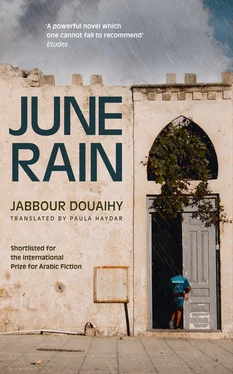Before Samih took on the job of standing in front of the hot oven, he used to socialise with the women, too. His father tried to get him away from the bakery and away from the heat especially. He let him work beside him for a while, but it wasn’t long before his heart went out to him and he suggested Samih try accompanying his uncle. His uncle refurbished mattresses and served his customers in their homes, the exact opposite of a baker. Samih would carry the tools as they went from house to house. The woman of the house would leave the mattress outside the front door or in an open space where he could work on it comfortably. They worked at people’s houses while the men were out working. Samih would open up the mattress or the comforter and his uncle would start pounding the dead cotton, fluffing it up for Samih to stuff back inside and then sew back up again. It was a simple trade, easy to do, and didn’t require anything more than an iron rod, a needle and some thread… and an ability to please women, too.
But Samih went back to the bakery and picked up his father’s bread paddle anew after his death. He only closed the bakery for three days in order to mourn for his father, in loud intermittent sobs, after bearing his coffin, all by himself at the front end while four men carried from behind. He returned the toolbox to his uncle and bid him goodbye saying he was his father’s only child and he didn’t want the bakery to close down. His uncle gave him a look of real pity and said simply, ‘Be careful of your eyes, nephew.’
The bakery was his whole life and he seemed content with it. He was there seven days a week, Sundays the busiest of all. People brought trays of kibbeh to be baked in the oven, bulgur wheat and meat. They brought him trays of kibbeh by the hundreds. It was a long day but very profitable; Samih wouldn’t finish until two o’clock in the afternoon, after which he would relax and enjoy his free time. He’d change his clothes, take a bath (once a week), comb his hair and go out to the main street. He’d head straight for the public water fountain which was about two hundred metres from his house and the bakery. He walked there with his head held high: a new Samih looking at the onlookers as if to lure their glances his way. On this day he was out for a stroll like everyone else, out of the house for no other reason than to be like all the other people. Sometimes it happened that the neighbours or people out walking, heading for that same location, would see him on the road during the middle of the week, going to the store near the spring to buy eggs or yogurt. On those days he’d be dressed in his work clothes, walking in a hurry, looking straight ahead, intent only on getting what he needed and going back home. A quick trip that was nothing more than an extension of his work at the bakery.
But how would he get a feeling for Sunday if he didn’t put on his clean shirt and walk slowly, nearly all the way to the water source, and stop there alone? He didn’t have time to enjoy the company of friends. He stood up straight, in the middle of the sidewalk, not leaning against any wall or tree, trying to occupy an empty space all to himself and not share it with anyone. If some women passed by him, they smiled. There was Samih in his Sunday clothes. They smiled at seeing him out of the bakery, as if he wasn’t qualified to do anything except stand in front of the hot oven making bread. He scrutinised everything that passed along the road, watching every passing thing like an event. There were the American cars or German Mercedes, which had recently grown in number — he followed them with his eyes until they disappeared around the bend; there were the young girls strolling up and down the main road arm in arm whispering and giggling whenever the young men looked their way or made comments; or there was a wedding procession or a bicycle race. He would smile when the leading racer appeared, leaning with all his effort over the handlebars of his bicycle. Samih would come a little closer to the public water fountain where the cyclists in their colourful clothing slowed down to grab bottles of water or sandwiches from the crowd waiting there for them, helping them stay the long course of the race. He knew they would climb the high mountains on those little bicycles of theirs. He waited for the last of the cyclists in the Homenetmen Club race and clapped for him with lots of enthusiasm. He clapped all by himself where no one else was waiting, which made the bystanders laugh as he concluded in a loud voice on his way towards the crowd gathered on the pavement who were also watching the scene:
‘The race is over. You can all go home now!’
When the town split into two, his house ended up being on the enemy side, but he didn’t leave it. They advised him to go to his own clan, as they called it, out of deference to the Bedouin tribes, but he refused. He said, ‘This is my house, the house of my father and my grandfather, and I’m going to stay in it. I didn’t harm anyone and everyone loves me and they’re all my customers.’ He stayed in the house, a mere five hundred metres from the border of his family’s neighbourhood, a stone’s throw away. When the shooting started at the beginning of the tensions, some of his family members would call out to him loud enough to be heard from behind their barricades to make sure he was safe. He was able to hear them clearly but he avoided answering. If he heard a voice calling to him when he was outside his house, he hurried back inside and shut the door behind him. Samih remained on the wrong side of the green line.
It hadn’t come to be called the green line yet. That was a fancy term that was later coined in the Beirut newspapers for the line of battle that divided the capital for two decades and extended from the hills overlooking the city down to the Damascus Highway and all the way to the port. We on the other hand had no name for it, or maybe we hadn’t managed to arrive at a concrete form for the idea of that imaginary line separating the Semaani family neighbourhood, which extended all the way to the southern edge, from the Rami family to the north of the town, though it was drawn there like a protruding line on a relief map. The townspeople all knew about it and knew precisely where it was, where it stretched to, where it took a turn, and where it got lost at some unidentifiable juncture. The green line, as demographics would have it, gave control of the town’s western outlet leading to the city to the Semaani family, while the Rami family controlled the eastern outlet that led to the towns in the elevations above. The coast was theirs and the mountains were ours. But the line became complicated once inside the crowded neighbourhoods and the ancient, damp quarters. It turned upwards around a cluster of houses whose inhabitants stood strong with all their men and guns, extending the Semaani neighbourhood up into the mountains. Or it left behind some deserted areas that stretched between the two quarters and were exposed to the opposing side’s barricades, making it impossible to live there. The important thing was that this line was drawn in the minds of the townspeople, young and old alike. They all knew that if they took ten extra steps in one direction or the other, they moved from one neighbourhood to another. The main road was not the divider; it was much more difficult than that, which was why it was nerve-wracking to clarify the situation to strangers. The line was drawn in stages, in conjunction with the rise in tensions. After the Burj al-Hawa incident, crossing the line remained possible for those who hadn’t been directly involved, but movement started to diminish when the barricades were set up. It seemed as though a deep abyss had come between the two quarters. The problems ended, the commander of the army was elected President of the Republic with the blessing of American special envoy to Lebanon Richard Murphy, and Egyptian President Gamal Abdel Nasser, and a national unity government was formed. It sent the army back to the town and the barricades were lifted after eight months during which the green line hadn’t budged an inch.
Читать дальше












